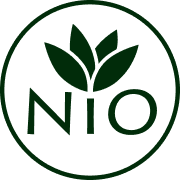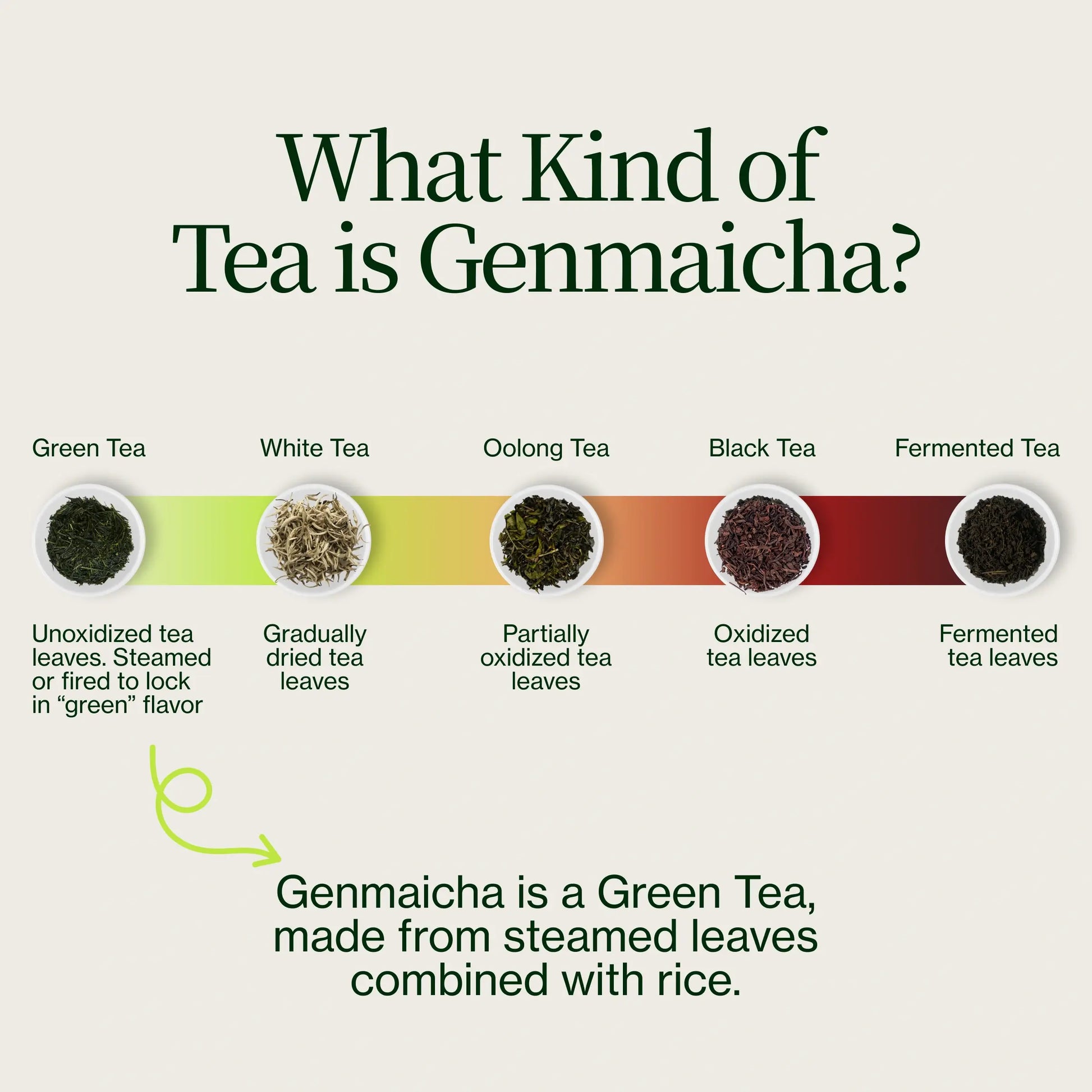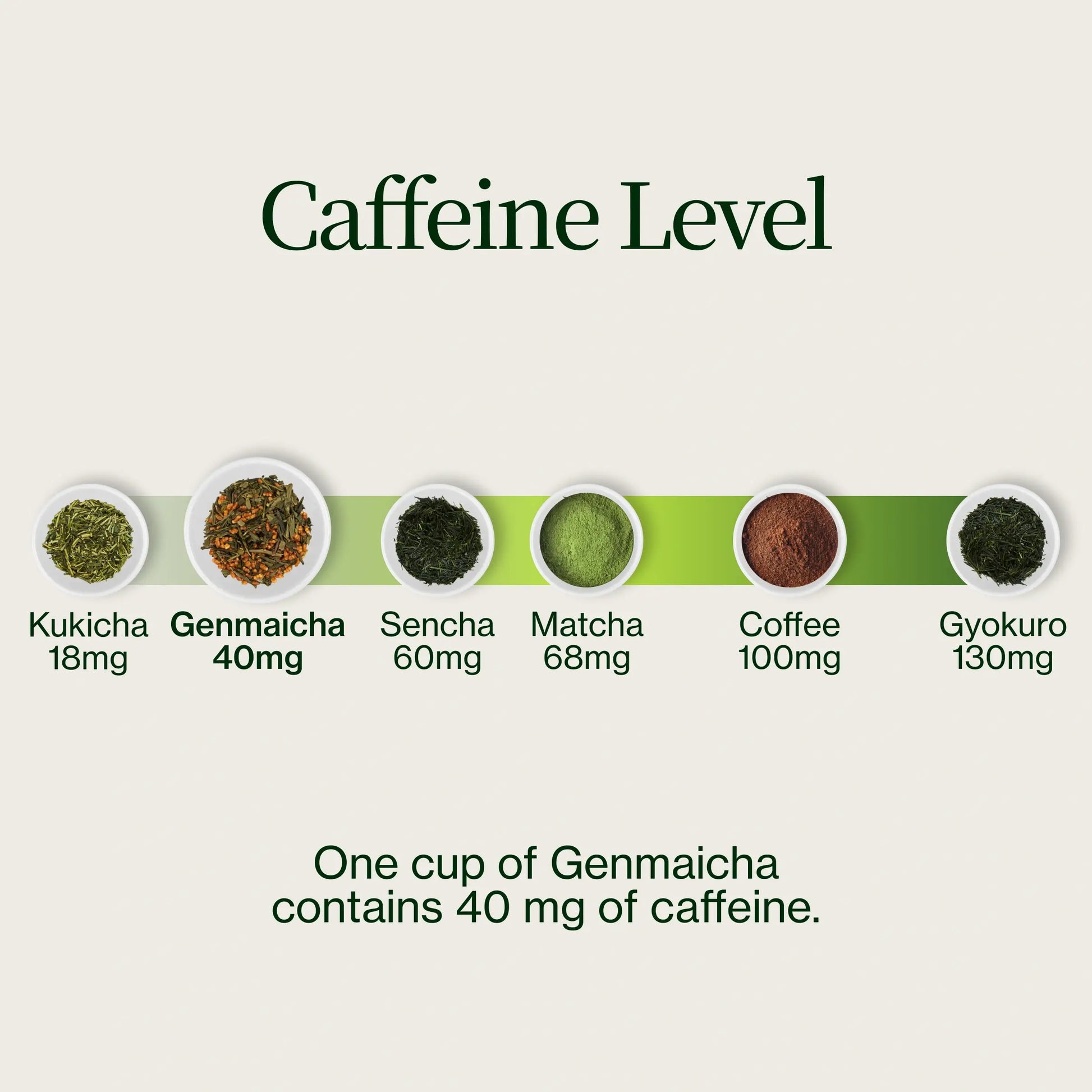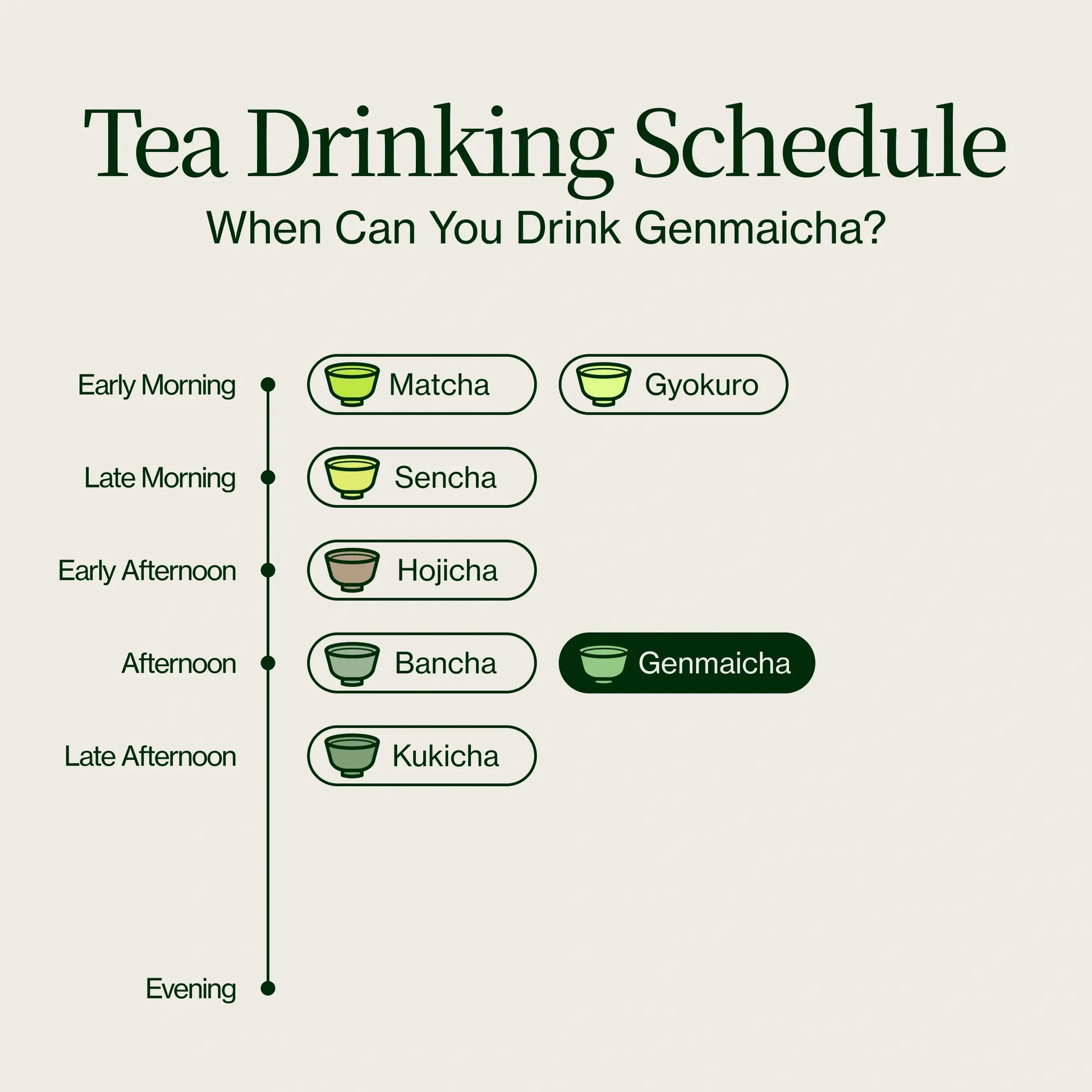Matcha Genmaicha Shizuoka
Matcha Genmaicha Shizuoka
🚚 Envío gratuito a partir de 55$
🍃 Libre de pesticidas
🇯🇵 Procedente directamente de Japón
🔐 Pago seguro
😍 Excelente servicio al cliente
Bloque de texto
No se pudo cargar la disponibilidad de retiro
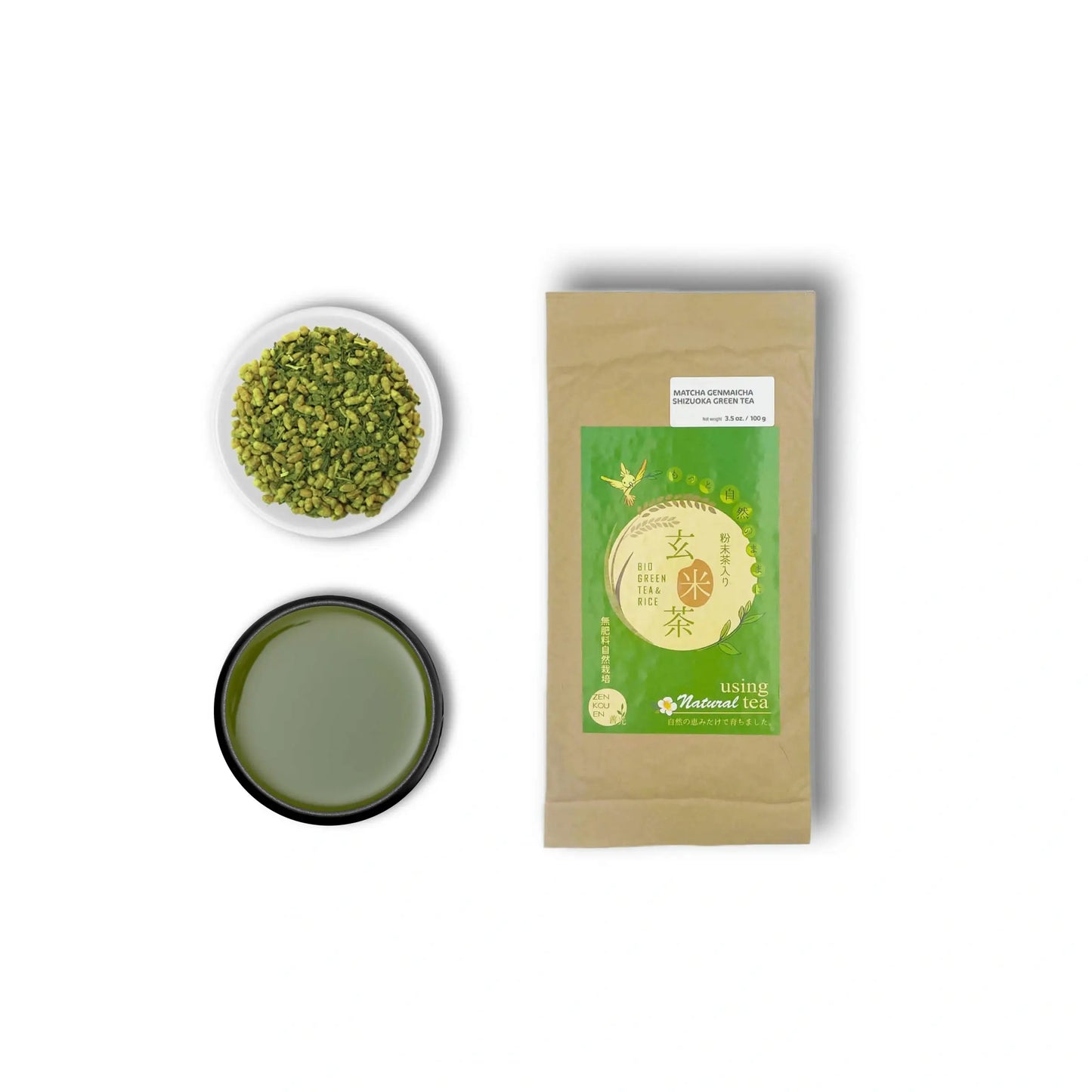
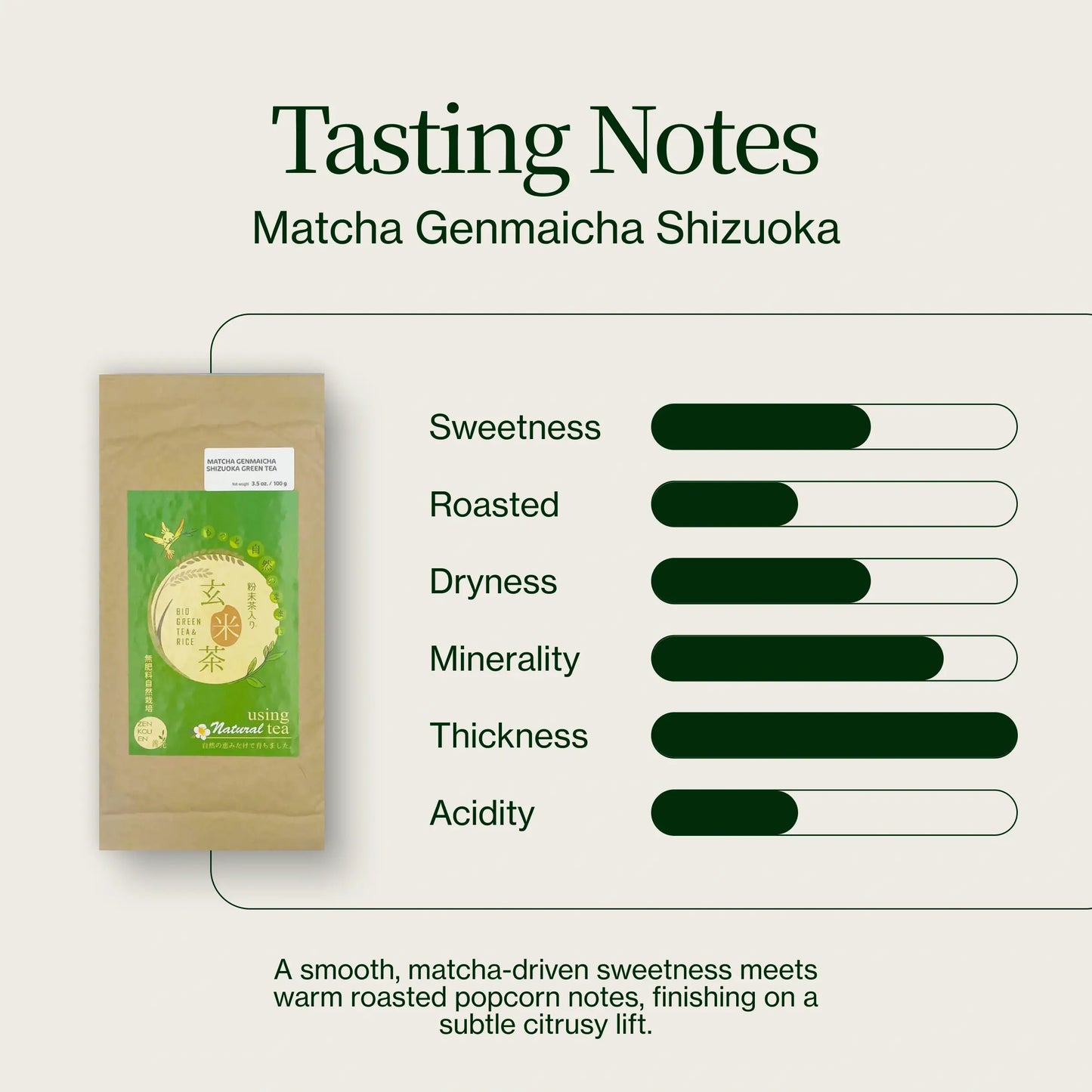


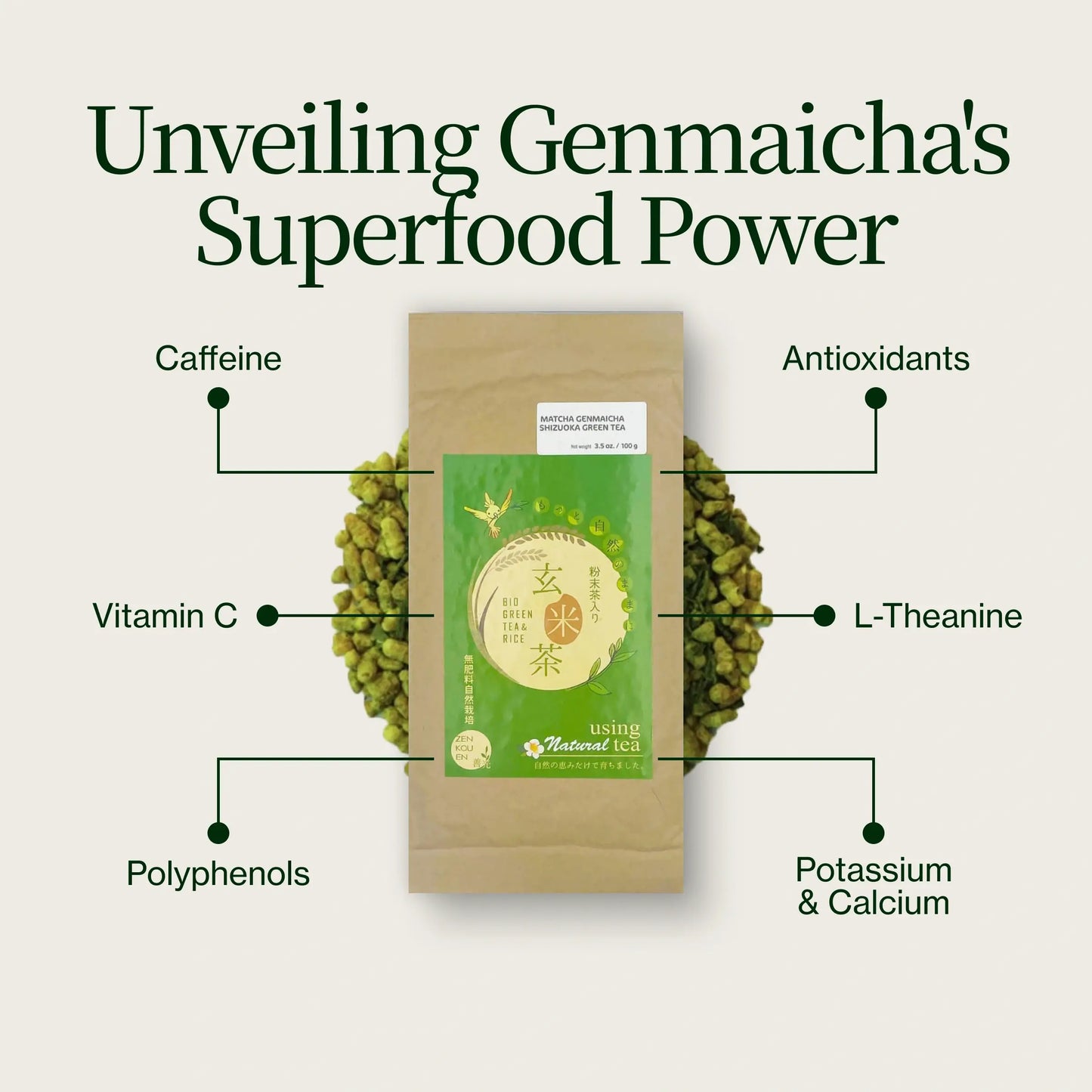
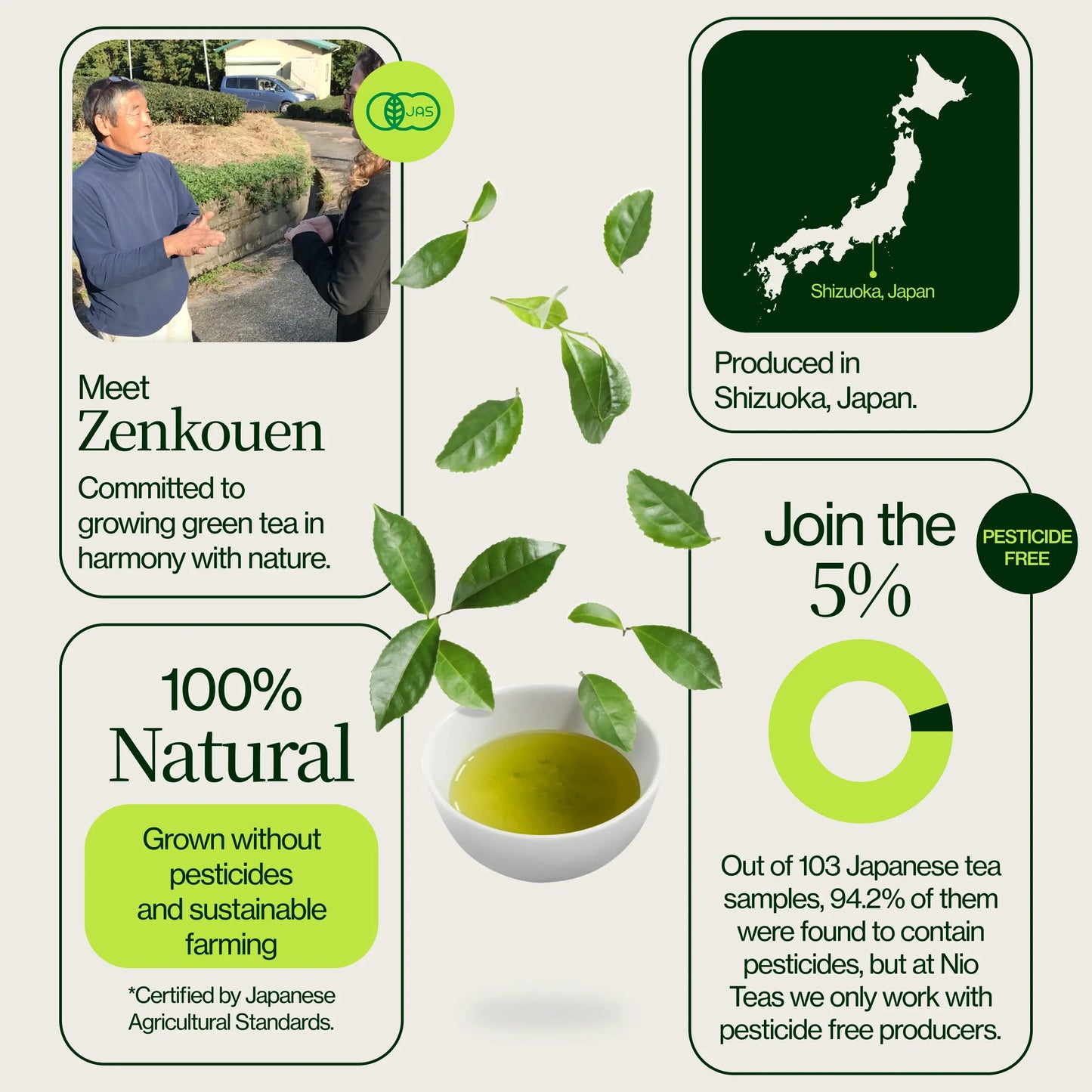
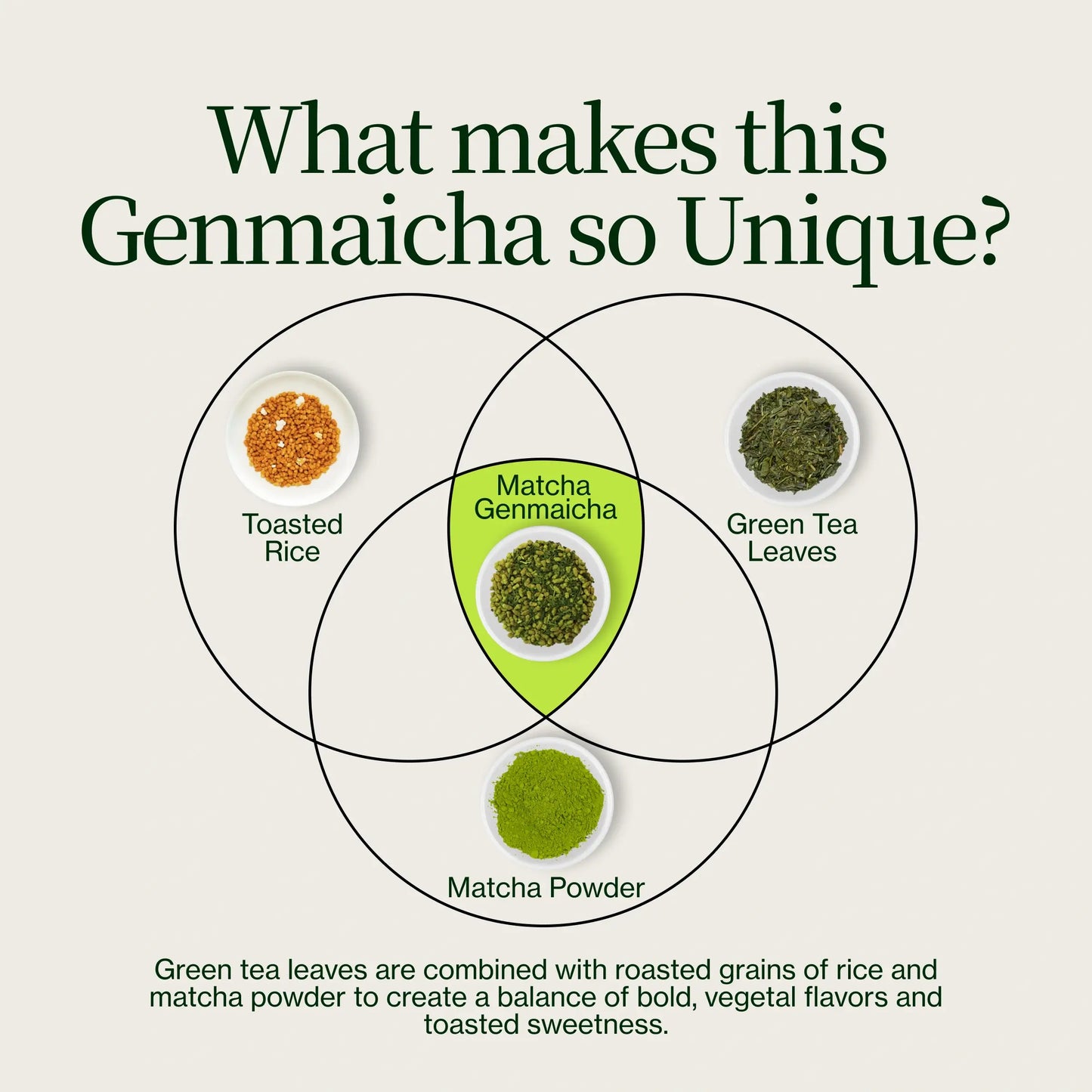
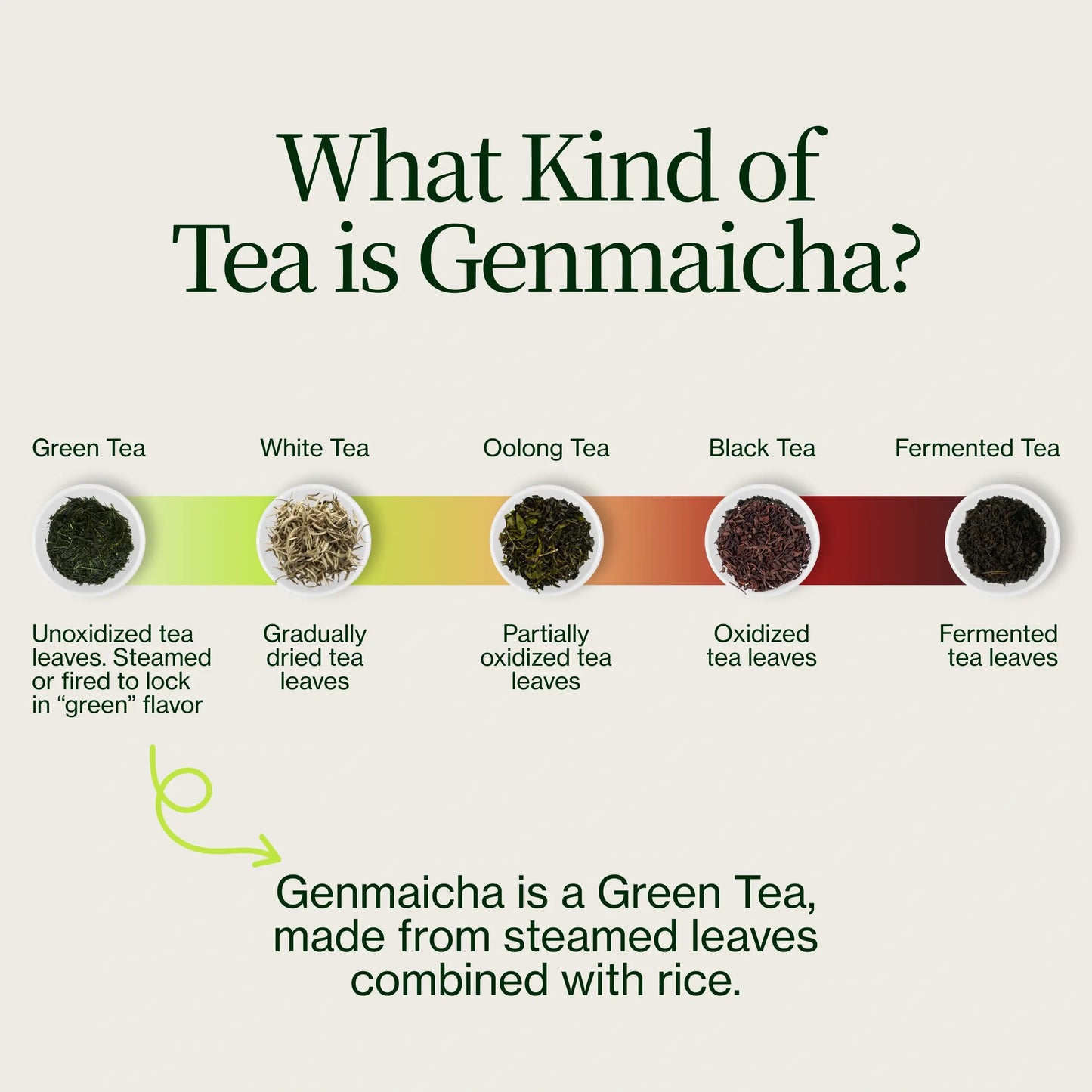
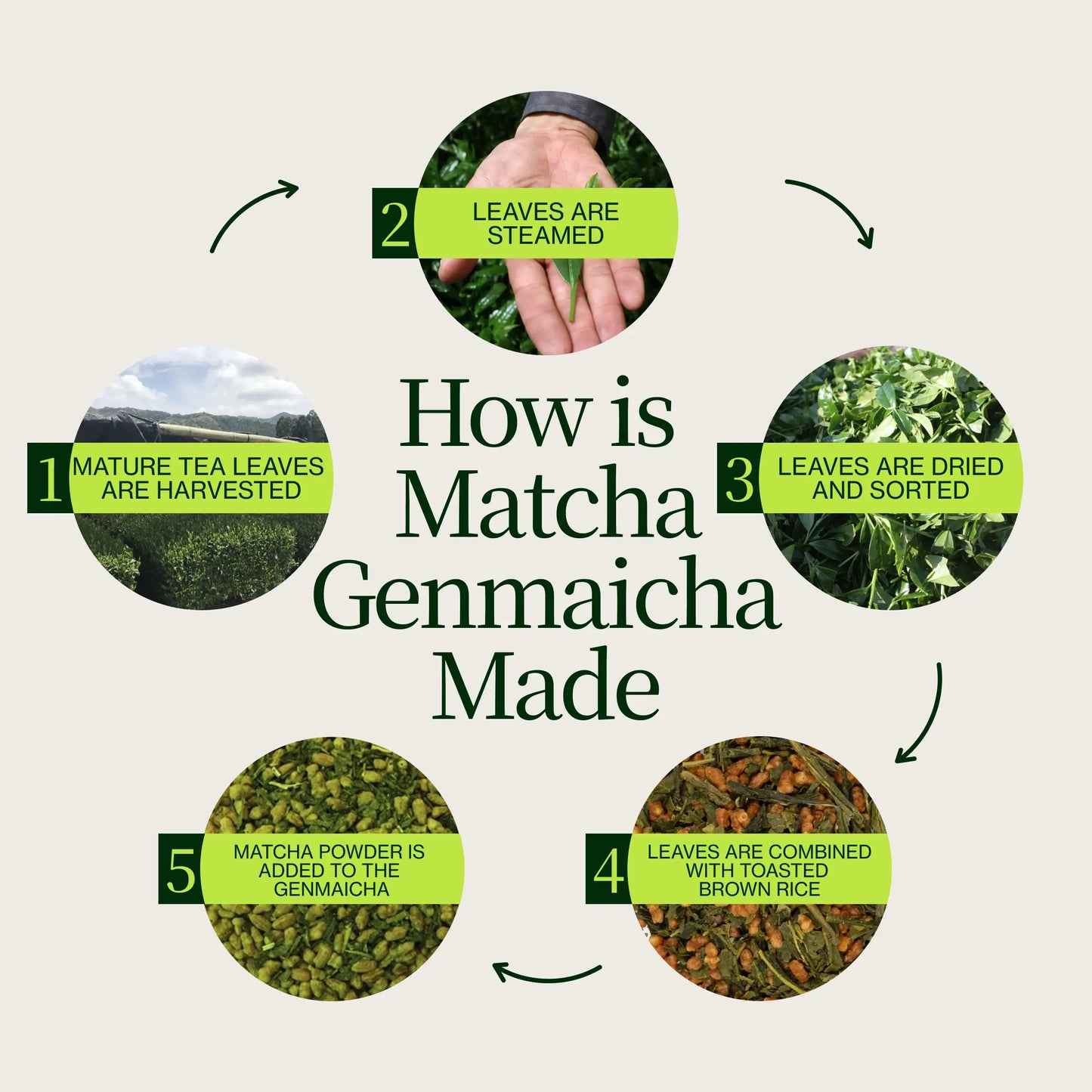
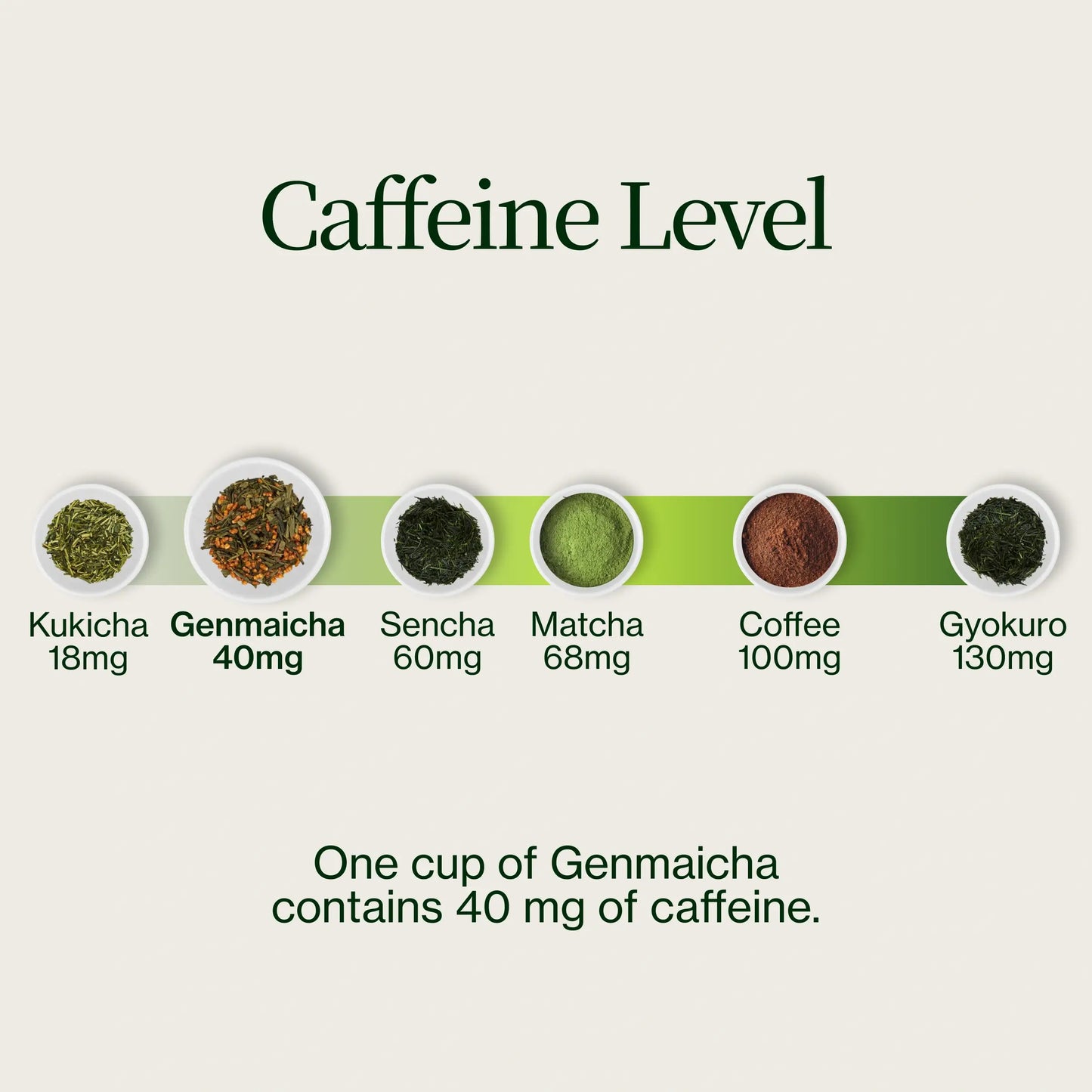
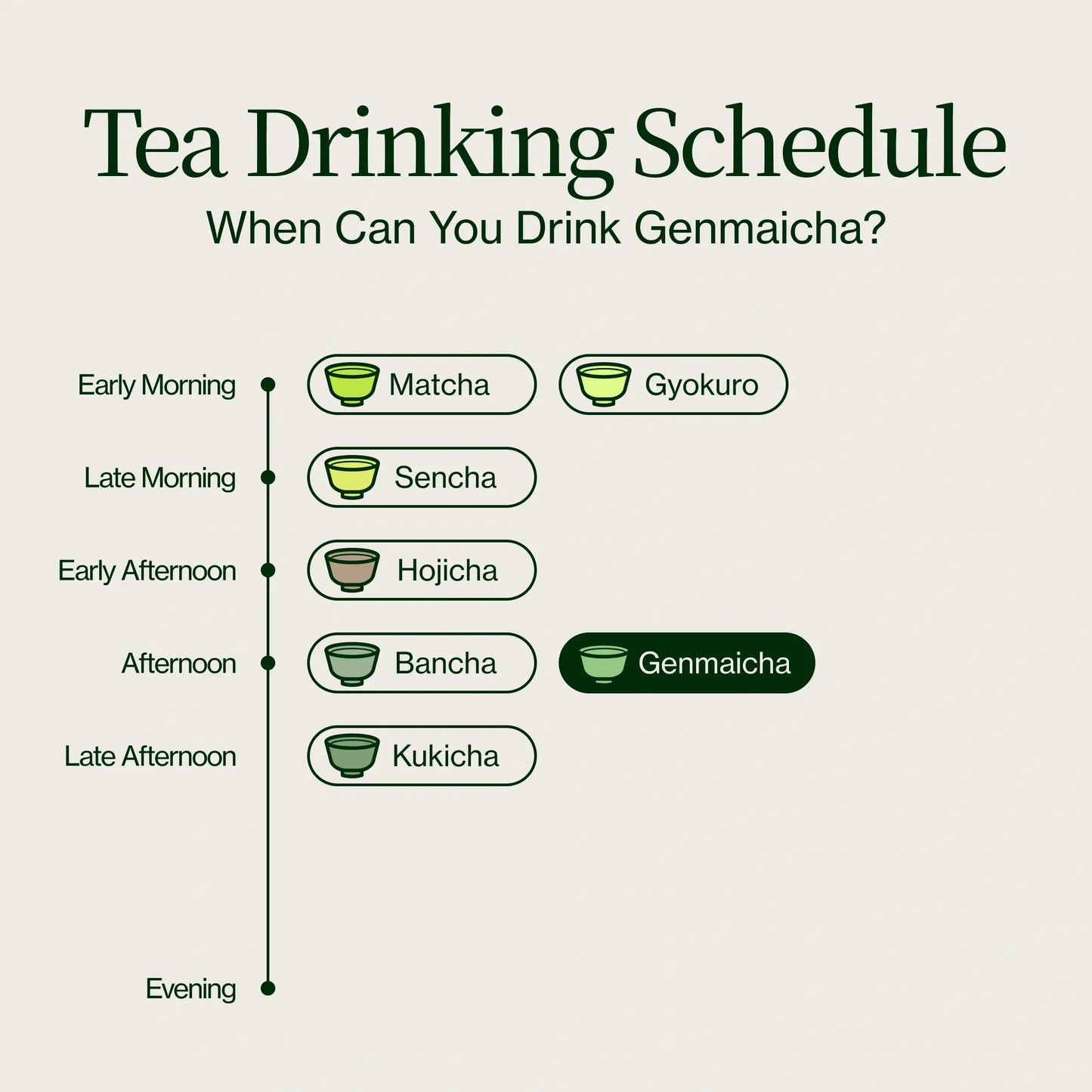
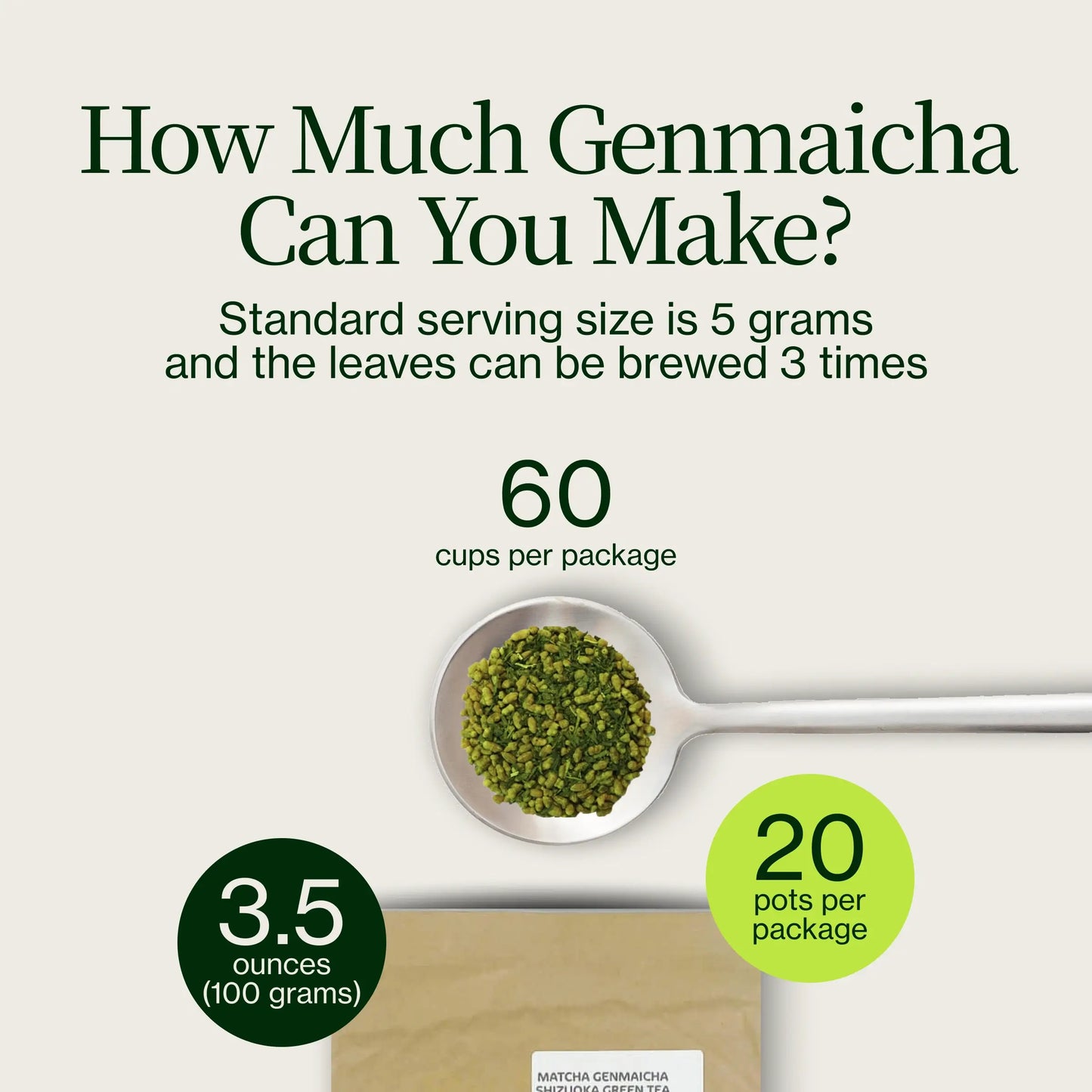

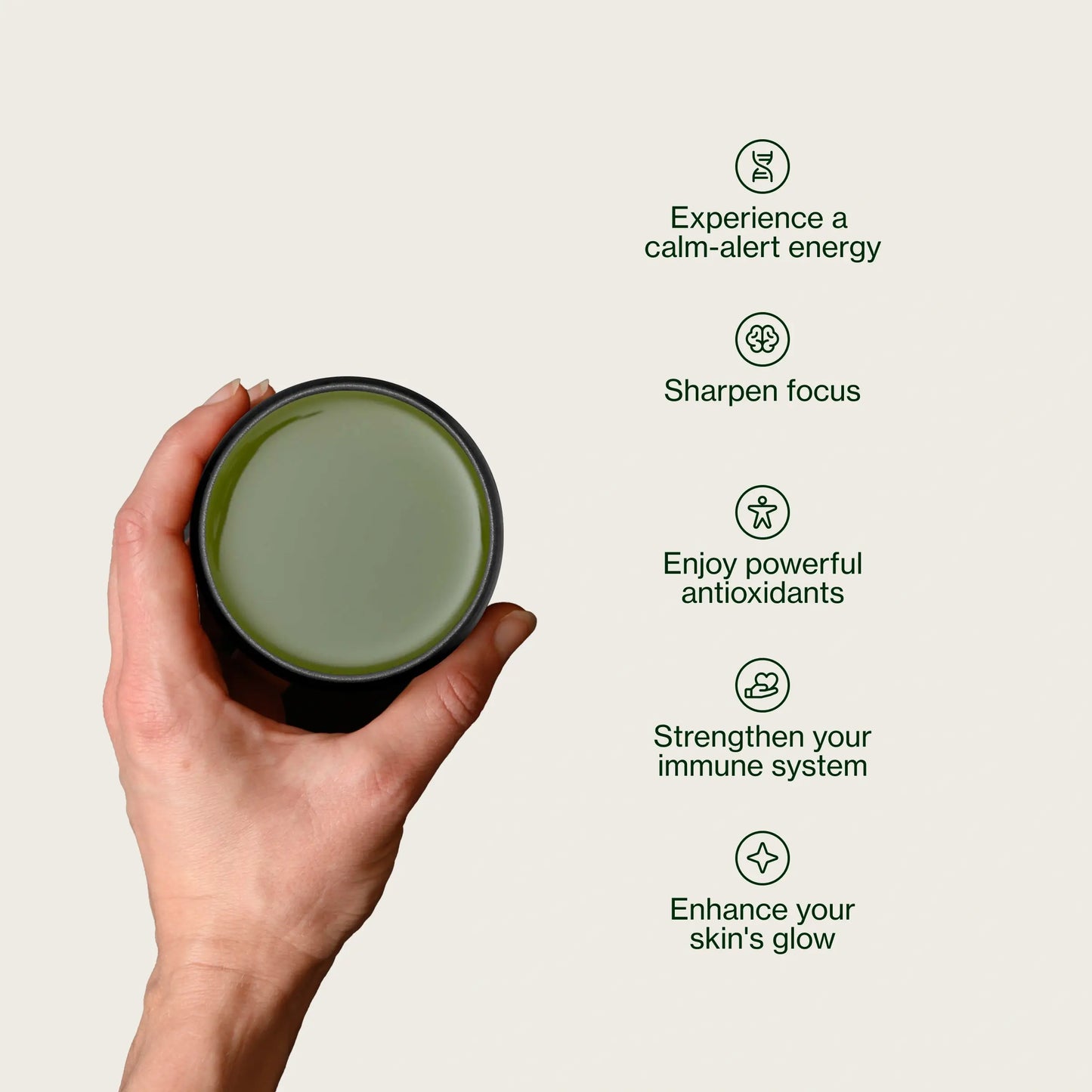



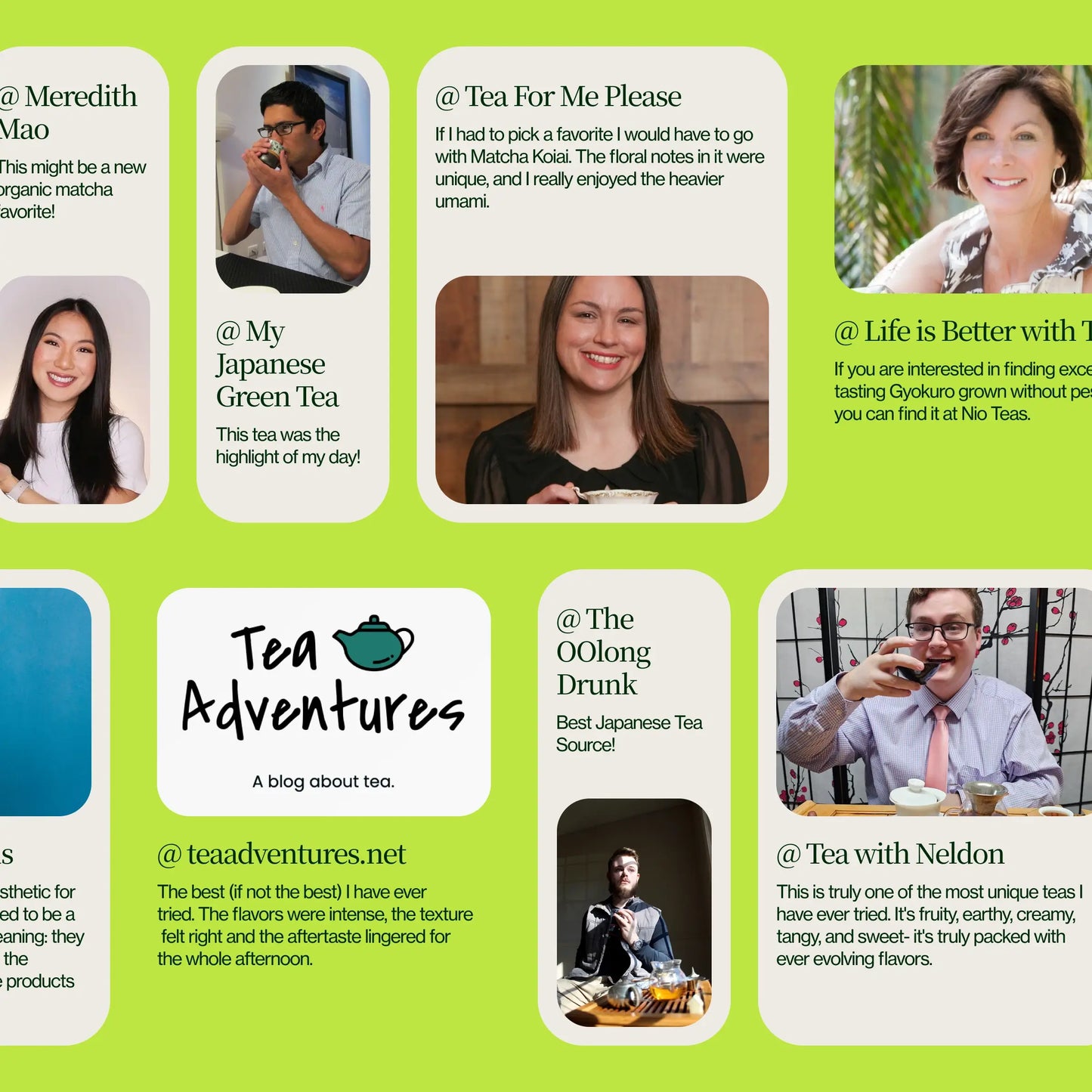
El Matcha Genmaicha El té verde Shizuoka es un té verde único elaborado combinando polvo de matcha, hojas de té y arroz tostado, lo que produce un gran sabor.
Sabor
Observando la apariencia
Las hojas de la Genmaicha El té matcha es de color verde oliva, el arroz es de color naranja parduzco y todo está cubierto con un polvo verde.
Evaluación del aroma
El aroma que desprenden las hojas secas del matcha Genmaicha Son cítricos y tostados, como pan recién horneado
Degustación del té
Este matcha Genmaicha Comienza con un sabor suave y agradable con toques de verduras al vapor. Posteriormente, los sabores tostados, a nueces y a palomitas de maíz se hacen presentes en el paladar medio. Las notas de cata más cálidas pronto se transforman en una
Evaluación de la sensación en el paladar
La estructura de este matcha Genmaicha Es muy interesante, comenzando con el suave sabor vegetal de un matcha, luego los perfiles de sabor tostado comienzan a destacarse y finalmente el paladar se limpia con estos perfiles de sabor ligeramente más cítricos de las hojas de té.
Este Genmaicha El matcha es 100 % orgánico.
En Nio, nos enorgullecemos de nuestra colaboración con productores de té que comparten nuestro compromiso con las prácticas de cultivo orgánicas y sin pesticidas. Gracias a nuestra amplia experiencia, hemos sido testigos de cómo este enfoque no solo produce tés con un sabor excepcional, sino que también promueve campos de té más saludables.
Estas granjas con conciencia ambiental actúan como santuarios para la fauna local, fomentando un ecosistema próspero. Al obtener tés de estas granjas, nos dedicamos a promover la sostenibilidad, proteger el medio ambiente y promover un enfoque más saludable en el cultivo del té. Nos honra colaborar con agricultores que comparten nuestros valores y nuestra visión de un futuro más sostenible y ecológico en la producción de té.
Nio Teas Proceso único de abastecimiento de cultivo orgánico
- Ponemos mucho cuidado en el proceso de degustación para identificar el perfil de sabor perfecto para cada té.
- Estamos en comunicación constante con nuestros productores de té para comprender sus prácticas de cultivo y garantizar que se adhieran a métodos libres de pesticidas y químicos.
- Nos gusta realizar visitas in situ a los campos de té y a las instalaciones de producción para asegurarnos de que el té se produce con cuidado.
- También nos gusta asegurarnos de que los campos proporcionen un entorno saludable para que la vida silvestre local prospere, promoviendo un ecosistema equilibrado y próspero.
Té JAS
Al explorar nuestros paquetes de té, notará la certificación JAS (Estándar Agrícola Japonés), regulada por el gobierno japonés. Como parte de nuestra colaboración con las grandes plantaciones de té, les exigimos que obtengan la certificación JAS mediante rigurosos análisis y muestreos de suelo para garantizar los más altos estándares de calidad.
Además, nos enorgullece trabajar con pequeñas plantaciones que pueden tener limitaciones de recursos para realizar análisis exhaustivos. En tales casos, aceptamos su té con la etiqueta "libre de pesticidas", lo que les brinda la oportunidad de vender su té de excepcional calidad. Esto nos permite apoyar a los pequeños agricultores y, al mismo tiempo, mantener nuestro compromiso con la calidad. Nos dedicamos a promover la transparencia y a fomentar colaboraciones positivas con plantaciones de té de todos los tamaños.
¿Por qué debería elegir Matcha Japonés Orgánico? Genmaicha té
Si bien siempre es importante optar por un té cultivado orgánicamente, es particularmente importante cuando se trata de matcha japonés orgánico. Genmaicha té. Como se mencionó anteriormente, cuando bebes Genmaicha Con el matcha, consumes más hojas, así que si hay pesticidas o químicos en el té, recibirás una dosis mayor de los mismos.
Nos aseguramos de que todos los tés de nuestro sitio web se cultiven sin el uso de pesticidas ni productos químicos, y el matcha Genmaicha No es la excepción. Al visitar estos campos de té sin pesticidas, observamos la diversidad de plantas y animales que prosperan entre las hileras de plantas. Esto nos permite beber té con tranquilidad, sabiendo que fue cultivado de forma más suave y sostenible.
Cómo preparar el té
Preparación tradicional
Para preparar Genmaicha Con matcha, recomendamos usar una temperatura ligeramente más alta y un tiempo de infusión más corto. En cuanto a Genmaicha Té matcha: el sabor se libera rápidamente, pero las temperaturas más altas pueden realzar algunas de las notas más cálidas del té.
Primera infusión
Paso 1: Calentar el agua a 80 °C (175 °F), la temperatura ideal para el matcha. Genmaicha .
Paso 2: Añade 5 gramos de matcha Genmaicha a tu tetera y vierte 150 ml de agua calentada.
Paso 3: Deje que el Genmaicha Deje reposar el matcha en el agua durante 1 minuto sin remover las hojas. Esto permite que el arroz y las hojas de té liberen un agradable sabor y aroma tostado en el agua.
Paso 4: Transcurrido el tiempo de infusión, vierta el matcha preparado. Genmaicha De la tetera. La tetera filtrará automáticamente las hojas y los tallos para que no terminen en tu taza.
Disfruta de tu deliciosa taza de matcha. Genmaicha ¡té verde!
2da infusión
No dejes que tu matcha Genmaicha ¡El té verde se desperdicia después de la primera infusión! Puedes preparar más tazas de té con las mismas hojas. Simplemente agrega agua a la misma temperatura a la tetera y deja reposar las hojas durante 20 segundos para las siguientes infusiones. En cada infusión, obtienes un perfil de sabor ligeramente diferente, lo que te permite disfrutar de tres tazas de té diferentes con el mismo lote de hojas. ¡Es una excelente manera de descubrir la complejidad y versatilidad de este exquisito té!
Artículos de té necesarios
Para realzar tu matcha Genmaicha Para llevar la preparación al siguiente nivel, recomendamos usar una tetera kyusu para disfrutar de la mejor experiencia. Esta tetera tradicional japonesa está diseñada para permitir que las hojas de té se desplieguen y liberen sus cálidos sabores tostados en el agua.
El kyusu también cuenta con un colador integrado que filtra automáticamente las hojas de té al servirlo, garantizando una experiencia suave y placentera sin que entren hojas en la taza. Invertir en una tetera kyusu mejorará su Shizuoka. Hojicha ritual de preparación y le ayudará a apreciar plenamente el sabor excepcional de este té único.
Alternativa sin vajilla
Si no tienes una tetera kyusu en casa, la siguiente mejor alternativa a la hora de preparar el Genmaicha El matcha es el colador de té. Puede que no te dé un sabor tan intenso como el kyusu, pero al menos evitará que las hojas de té se filtren en tu taza. Siempre puedes usar una tetera más adelante.
Ubicación de la producción y agricultor
¿Dónde está el Gyokuro Genmaicha ¿De dónde vienes?
El Matcha Genmaicha Se cultiva en Shizuoka, la región productora de té más grande de Japón. Shizuoka se encuentra a solo unos cientos de kilómetros de Tokio y cuenta con un paisaje diverso, con llanuras y pequeñas montañas. Es quizás más conocido por sus icónicas vistas del monte Fuji y tés como el Genmaicha A poca distancia de este emblemático pico se cultivan té verde de arroz integral con matcha.
Este matcha Genmaicha El té verde se cultivaba en una pequeña plantación en las colinas de Shizuoka. Debido a que las plantas de té se encuentran enclavadas en estas colinas, reciben sombra parcial durante el día, lo que puede mejorar el sabor del té verde. Esto se debe a que, al exponerse a la luz solar directa, la planta de té comienza a producir más catequinas, las cuales le dan el sabor amargo. Cada vez que la planta de té se ve privada de la luz solar, ya sea directa o indirectamente, se reduce la cantidad de catequinas en las hojas.
¿Quién elabora el té? Gyokuro Genmaicha ?
El Matcha Genmaicha El té lo elaboran los agricultores de Zenkouen. Tuvimos el privilegio de reunirnos con ellos y compartir unas tazas de té. Genmaicha Nos causó una muy buena impresión, ya que lograba un buen equilibrio entre el sabor a nuez del arroz y el dulce sabor vegetal de las hojas.
También visitamos las instalaciones de Zenkouen y pudimos observar algunos de sus fertilizantes orgánicos. Los agricultores utilizan una mezcla de cáscaras, materiales orgánicos y carbón vegetal para nutrir las plantas sin usar pesticidas ni productos químicos. Es importante crear un entorno saludable no solo para el té, sino también para otros animales.
Cuando llegamos a los campos de té, interrumpimos a dos serows que pastaban en medio de su cena. Se estaban dando un festín con la vegetación que crecía entre los campos, y fue una buena señal ver que en el campo podían crecer otras plantas además del té.
Cultivar y variedad de planta de té
Este matcha Genmaicha Se elabora a partir del cultivar Yabukita, el más popular en Japón.
Yabukita
El Yabukita es actualmente el cultivar de té más popular en Japón, representando el 75 % de la producción total. Una de las razones es su resistencia a las heladas, lo que las prepara para los inviernos relativamente fríos del centro de Japón. Otra razón de su popularidad son sus intensos sabores salados y a vegetales al vapor.
Beneficios de la mezcla Genmaicha con té matcha
El Matcha Genmaicha El té verde ofrece muchos beneficios. El más evidente es que el matcha le aporta un sabor muy intenso.
Si alguna vez has probado el matcha, sabrás que su sabor es mucho más intenso que el de un té verde normal. Lo mismo ocurre con el matcha. Genmaicha Té, que tiene el sabor rico y con cuerpo de un matcha combinado con las agradables notas cálidas de cereales de un Genmaicha .
Además de obtener un sabor más fuerte, también obtendrás más cafeína cuando bebas. Genmaicha Con matcha. Esto se debe a que el polvo de matcha se mezcla directamente en la taza de té, lo que permite consumir una mayor cantidad de la hoja.
Cuando se bebe un té verde típico, solo se consumen los compuestos de la hoja disueltos en agua. Dado que el matcha es un té en polvo mezclado directamente con agua, se consume la hoja entera, razón por la cual Genmaicha El matcha tiene un mayor contenido de cafeína y nutrientes en comparación con un genmai cha típico.
matcha Genmaicha vs. té de arroz tostado regular
Quizás te encuentres tratando de decidir entre matcha Genmaicha y regular Genmaicha . Cuando recibas tu Genmaicha Con matcha, se obtiene mucho más sabor a té verde para equilibrar el arroz tostado. Una de las quejas sobre el arroz normal... Genmaicha es que no sabe lo suficiente como a té verde y en cambio lo que realmente obtiene es el sabor del arroz tostado.
El Matcha Genmaicha es la solución perfecta para esto, ya que te proporciona un sabor intenso y clásico del té verde. También notarás un vibrante color verde jade y un mayor impulso de energía con este té. Porque es... Genmaicha Con el polvo de matcha, obtendrás un contenido de cafeína mucho más alto en comparación con un té normal. Genmaicha Té. Dependiendo de lo que busques, ¡este podría ser el té perfecto para disfrutar por la tarde!
Preguntas frecuentes
Envío: Nos complace ofrecer envío gratuito en todos los pedidos, utilizando la empresa de transporte más económica disponible en tu país. El tiempo de entrega estimado suele ser de 5 a 7 días para clientes en EE. UU. y la UE, con tiempos de espera ligeramente superiores, de hasta 10 días, para clientes fuera de estas regiones. Si necesitas un envío urgente, también tenemos opciones disponibles por un precio simbólico.
Problemas con el pedido: Si tienes algún problema con tu pedido, no dudes en contactarnos. Nuestro equipo de atención al cliente está disponible para ayudarte por correo electrónico en info@nioteas.com o a través de mensajes directos en Instagram en @nio_japanese_green_tea, lo que garantiza una asistencia y resolución rápidas.
Pagos: Aceptamos todas las principales tarjetas de crédito, PayPal y Apple Pay como métodos de pago convenientes. Además, podemos aceptar transferencias bancarias si lo solicitas durante el proceso de compra. Una vez recibido el pago, procesaremos y enviaremos su pedido con prontitud, garantizando una transacción sin contratiempos.
Devoluciones y reembolsos: Su satisfacción es nuestra máxima prioridad. Si no está completamente satisfecho con el té que recibe, infórmenos y con gusto le enviaremos uno nuevo. No es necesario devolver el té; quédese con él y compártalo con otros. Nos comprometemos a brindar un servicio al cliente excepcional y a garantizar que su experiencia con el té Nio sea extraordinaria.
